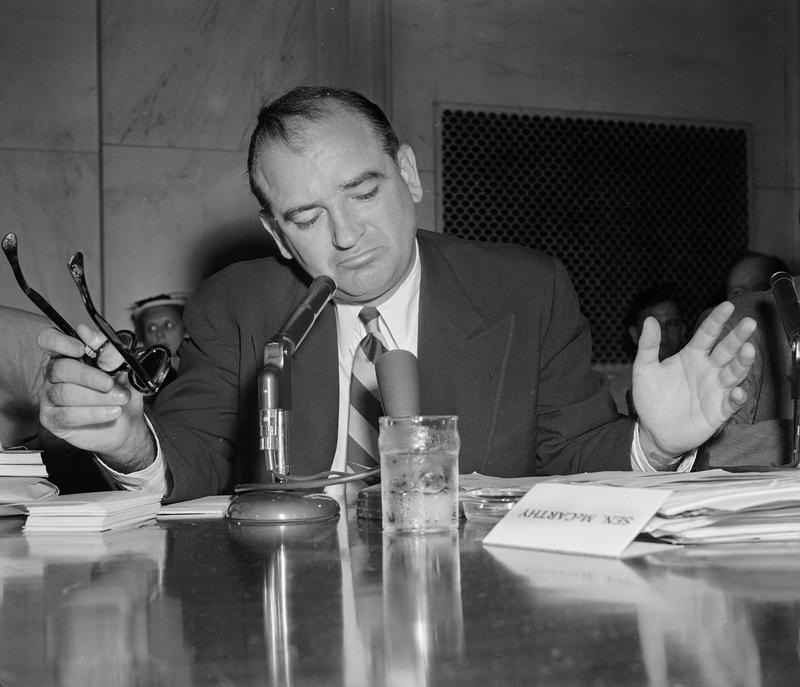The Birth of "McCarthyism"

Senator Joseph McCarthy rails against former president Harry Truman in this 1953 speech. Truman, McCarthy claims, has been popularizing "McCarthyism," a term coined by the Communist Party paper The Daily Worker, as a derogatory label for the senator's attempt to rid the State Department and other federal institutions of Soviet spies. (In fact, most historians credit the cartoonist Herblock with inventing the word.) McCarthy suggests another entry in the political lexicon: "Trumanism," which he defines as "the placing of your political party above the interests of the country." He then goes on to accuse Truman of protecting the accused Soviet spy Harry Dexter White, a high-ranking US Treasury official who died of a heart attack in 1948. He details Truman's shifting series of excuses for not acting on intelligence reports that White was passing information on to the Soviets. McCarthy's voice drips with sarcasm as he cites evidence from J. Edgar Hoover "a man whose truthfulness has not even been questioned by the Communist Party." In the end, he interprets Truman's blaming of "McCarthyism" for hounding White to death as another way of saying, "Isn't that nasty McCarthy an awful man?" He then broadens his attack, envisioning America being engaged in a war that was declared by Lenin in 1914. Recently 180 million people were under the yoke of communism. Now the figure has risen to 800 million. He blames "fuzzy-minded liberals" for refusing to confront the danger head-on.
For those who have only heard McCarthy in sound bites, this eight minute speech provides an excellent example of his speaking style and helps understand the enormous power he briefly wielded. Compared to the empty, orotund phrase-making popular (then and now) politicians use when addressing grand issues, McCarthy's delivery is intimate, possessing a sly humor reminiscent of W.C. Fields. One is tempted to patronizingly dismiss his message of a "Red" under every bed as paranoid fear-mongering, but recent evidence released by US intelligence sources and cables discovered after the fall of the Soviet Union strongly suggest that White was indeed passing information to the USSR, an accusation his family still denies.
Harry Dexter White (1892-1948) was an economist whose greatest moment came at the Bretton Woods Conference in 1944. The foundations for the post-War economy were laid at this meeting, with the establishment of both the World Bank and the International Monetary Fund. White then became Director of the IMF but resigned abruptly in 1947. After testifying in front of the HUAC committee and denying he was a communist, White died of heart attack which some report was brought on by an overdose of digitalis. Historian James C. Van Hook, reviewing Treasonable Doubt; The Harry Dexter White Spy Case, on the CIA website, lays out the opposing points of view on White's complicity:
As historians of the Cold War have long realized, one can explain developments in the early Cold War seemingly inimical to American interests—such as the division of Germany and the fall of China—without recourse to the simplistic charge of espionage. History is complex, and when history goes badly, it is not ipso facto the result of sabotage or betrayal. The problem with this approach, however, is that sometimes it runs up against contravening evidence. This is the problem Craig faces when discussing the VENONA decrypts and other data mined from recently opened Russian archives. … One may argue over whether these cables offer unmistakable evidence of espionage, but they certainly amount to more than what Craig terms “hard, circumstantial evidence” of inappropriate contact.
Joseph McCarthy (1908-1957) had a meteoric rise and fall, capturing headlines with his sensational charges of a wide-ranging Communist infiltration of government. Reviled after his death and for many years since, he has recently been the subject of attempts at rehabilitation, although most historians agree that the damage he did was out of all proportion to whatever "spies" or mere left-wing sympathizers he uncovered. As the Encyclopedia Britannica concludes:
After McCarthy’s reelection in 1952, he obtained the chairmanship of the Committee on Government Operations of the Senate and of its permanent subcommittee on investigations. For the next two years he was constantly in the spotlight, investigating various government departments and questioning innumerable witnesses about their suspected communist affiliations. Although he failed to make a plausible case against anyone, his colourful and cleverly presented accusations drove some persons out of their jobs and brought popular condemnation to others. The persecution of innocent persons on the charge of being communists and the forced conformity that the practice engendered in American public life came to be known as McCarthyism. Meanwhile, other government agencies did, with less fanfare, identify and prosecute cases of communist infiltration.
Audio courtesy of the NYC Municipal Archives WNYC Collection.
WNYC archives id: 151018
Municipal archives id: LT2634
